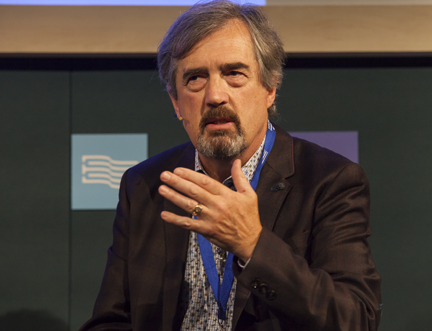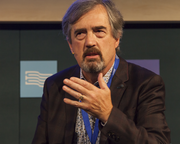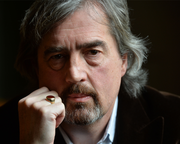More articles Monday 14 August 2017 4:00pm
Irish Author Sebastian Barry Speaks Eloquently at the Book Festival

Irish novelist Sebastian Barry says he hopes his writing will “release” people from the “stupidity” of prejudice against homosexuality and instead help them recognise its “radiance”. After reading from his new novel Days Without End, which features a gay relationship in mid-19th century America, the playwright and poet said part of his “evil plan” in writing the book was to depict the love he had witnessed between his son Toby and his boyfriend.
He added: “So the book would not just go to beautiful radiant Scottish people who are full of liberality, and kindness and reverence for all things gay, but also [to] Nigeria, where the laws are vile and vicious, and also into [US vice-president] Mike Pence’s bedroom – I hope he’s reading it.
“Because I want to transform this…I want to release people from this stupidity, this straight stupidity…so that they can spot the radiance. I mean, if you love a sunset, or a sunrise, on a great landscape, then you have to love the world of gaiety, as one might call it.”
Depicting raids on Native Americans in the 19th century American West, Days Without End also tells the story of Irish émigré Thomas McNulty and his relationship with so-called “prairie fairy” John Cole, a dancer who wears women’s clothing to entertain miners starved of female company.
The Costa Book of the Year-winning author said watching his son’s relationship had influenced this element of the book.
“Most of Irish literature unfortunately is written by gay people,” joked Barry, “not stupid straight people like me, so I’m very aware of that – that I can’t really be a proper Irish writer until I’m gay. I’m working on it, I’m working on it.
“But Toby showed me [the TV show] Ru Paul’s Drag Race. I thought, ‘who are these amazing people?’ A lot of these men have had terrible upbringings, gone through hell, and then by this medium of cross dressing become kind of manifest angels, that’s what it looked like to me.
“I did conclude at the end of it that to be gay is not something to tolerate, you know, we’re told to tolerate it – what does that mean? – it’s something to be revered: this is an incredibly important manifestation of us, and the quality of the love that I have witnessed between my son say and his boyfriend, which I’m sure is ubiquitous and universal and [there are] lots of instances of this, but I’m privileged to see this instance.
“[But it was] so much more magisterial, and beautiful, and carefully worked out, and mathematically correct than say the mayhemic relationships I would have had at that age with poor unfortunate young women in Ireland.”



 Major new partnership with Celtic Connections
Major new partnership with Celtic Connections 

